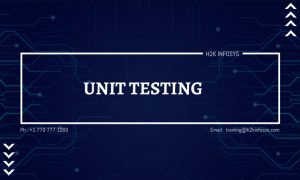Will I make a good QA engineer? Is the Quality Assurance career right for me? Are these questions bugging you? Then you should resolve them before enrolling for QA testing training. Let’s see in this blog what software QA testing is all about, the various career options moving forward, and if it is the right path for you? So, onward with the details.
What is QA Testing?
Quality Assurance (QA) Testing is a crucial process in software development that ensures the final product is error-free, meets requirements, and provides a smooth user experience. It involves systematically evaluating software through various testing methods, such as manual, automated, functional, and non-functional testing. The primary goal of QA testing is to detect and fix bugs early, ensuring the software is reliable, secure, and performs as intended. QA Testing not only focuses on finding defects but also on improving the overall software development process by implementing best practices, maintaining quality standards, and enhancing product quality and performance.
What is SQA?
Software Quality Assurance (SQA) is a systematic process that ensures software meets specified quality standards throughout its development lifecycle. It involves monitoring software engineering processes, methodologies, and activities to verify compliance with defined standards, such as ISO or CMMI. SQA focuses on preventing defects by implementing quality checks, testing, and validation at every stage of development. This proactive approach helps identify issues early, ensuring the final product is reliable, efficient, and meets user expectations. SQA encompasses various practices, including code reviews, testing strategies, and continuous process improvements, to maintain high-quality software outputs.
So, how can the Software QA team deliver this?
The 5 primary quality assurance functions involve:
- Technology Transfer – This is the part where the SQA team prepares a product or service design document and with trial and error and evaluates the product. Then they circulate the document, check, and approve.
- Validation – The validation plan is then lined up. The test criteria to validate the product is then set and sent for approval.
- Documenting – The team then documents any change in the process and sends it for approval.
- Assuring the quality of products– Effective methods of software testing ensure that the process managed with QA meets the overall quality.
- Implementing quality improvement plans – They ensure quality improvement after analyzing the feedback received by the quality control team. The idea is to improve the process to meet the standards set by the organization
As long as there is a rise in software development, the demand for software quality assurance experts can never diminish. The SQA engineers are responsible to maintain the standards of the software development process.
If you intend to get into the software field but not sure, how to foray into it, your focus should be on getting a good QA software testing courses from a reputed institute.
Who can make a good SQA testing engineer?
No one can be a better judge of your career more than you. So what are the important skills you require to make a good test engineer?
- Communication skills: Communication with the customer is always required for a QA tester, not to mention the communication with the team. Written and oral communication skills are a top priority for this job.
- Technical Skills: The aspiring QA testers should be familiar with the programming languages. However, as far as the testing skills are concerned, the software testing training from a reputed institute can help you acquire knowledge on:
- Project life cycle
- Testing concepts
- Various testing types
- Database concepts
- Test Plan idea
- Ability to analyze requirements
- Documentation
- Testing tools
- Analytical and judging skills: Analytical and problem-solving skills are crucial for SQA as their effort lies in thinking away from the way a developer does to identify the loopholes in the process, product, or service.
- Leadership skills: These skills are especially essential when you climb up the ladder as a QA lead and upwards. Honing leadership skills can act as a deciding factor in the career path you choose.
- Ability to wear the end-users’ shoes: A good tester is the one who can think like a customer and ensure that the product meets the customer’s needs. Of what use is the product if it does not make the customer happy, no matter how good it is.
What are the various career paths if you take up QA testing training?
Now that you have reached a point on whether or not to take up SQA testing as your career, let‘s see the various career paths that are in store for an SQA professional.
Let’s say you have completed the courses of software testing and are placed as an SQA tester. What next?
Evaluating your interests, skills, and expertise, can help you take up a profession of your choice.
Soft Skills:
If your heart is in people management, striking good communication with team and customers, then you have two options in front of you for the future:
- Business Analyst – These professionals are the bridge between the software team and the customer. 75% of the testers are known to take up the Business analyst role. If you are good at analytical skills and have domain knowledge with operating principles, then BA is the role for you.
- Managers: You enjoy management and have the ability to solve managerial tasks then, this is the ideal career path for you. Project managers, resource managers are the other options.
Technical Skills:
If your interest area is identifying and validating defects, documenting, reporting, etc, then the career path of a QA engineer looks as under:
- Junior QA engineer/tester
- QA Engineer/tester
- Senior QA Engineer/tester
- Lead Software Testing Specialist
Alternatively, testers go-ahead to become software developers. If you think, you are lagging in programming skills, you can learn them on the go and become a developer with a little amount of perseverance and patience.
Conclusion:
QA Testing Training is an excellent career choice, offering a rewarding path for those interested in technology and quality assurance. The growing demand for skilled QA professionals, driven by the need for flawless software, ensures ample job opportunities and career stability. With competitive salaries, room for advancement, and the chance to work on diverse and innovative projects, QA testing provides a fulfilling career. As businesses continue to prioritize quality and user experience, the role of QA testers becomes even more crucial, making this a smart and strategic career decision for anyone passionate about technology.

























